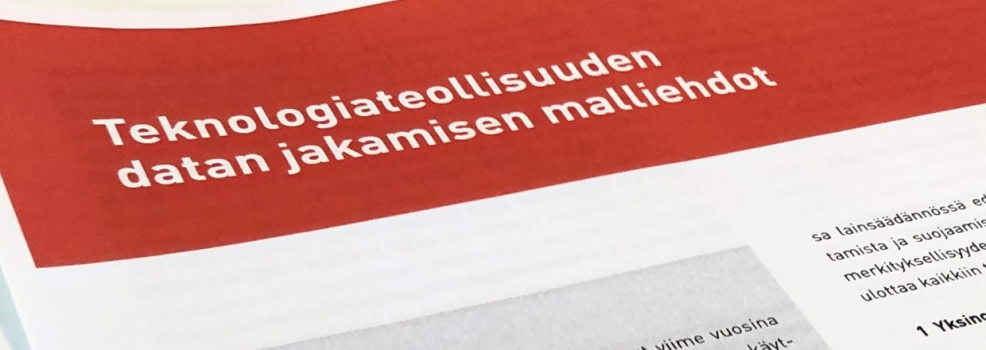
Model terms and conditions for data sharing—a solution for a socially, economically and ecologically sustainable society
The importance of data is constantly increasing in terms of the economy, the development of the community, and the daily life of individuals. There is an increasing amount of information available, and data can be utilised to increase the well-being of people, for product and process improvement in various industries and to improve the efficiency of raw material use.
Companies store large amounts of various data. There are technical solutions for data collection, and business models are being developed for the exchange of data. So far, there have been no established practices for agreeing on the rights to use data.
Technology Industries of Finland has solved the problem by preparing, together with its member companies and the law firm Krogerus, model terms and conditions for data sharing. Businesses can freely use them to a wide extent as the basis when agreeing on data sharing. The terms and conditions can be purchased through the Teknova online shop.
Data plays a key role in the renewal and growth of Finnish companies. Cloud services and modern communications networks will provide all companies with access to data collection and utilisation. The ability to efficiently use data to their advantage will be a significant competitive edge for companies.
The utilisation of data will enhance the cooperation between companies, and this will be reflected in savings related to logistics, the optimisation of product lifecycles, energy savings, and new business concepts that can be scaled according to the customers’ needs. The model terms are sold at Teknova's webstore.
Digital data can be used to prevent waste in supply chains and to optimise product lifecycles. Data flows connected to material flows form the basis for the further use of raw materials and for an efficient circular economy.
With the model terms and conditions:
- The utilisation of data can be openly included in inter-company negotiations and data can be utilised efficiently.
- The negotiation culture concerning data can be developed. The time required for negotiations can be shortened, and agreeing on the use of data can be facilitated with contracts that promote the efficient use of data.
- Companies can be encouraged to better identify their data and to develop partnerships promoting the use of data in business development.
The model terms and conditions define the concept of data utilisation broadly, with practically all data processing, use and modification included. The purpose of the terms and conditions is to clarify what a party can do with the data. An extensive right to use data creates value for data and encourages companies to invest in data-based solutions.
Several sections of the government programme discuss the sharing of public data and the promotion of open interfaces. This activity should be accelerated, because entirely new services and complete solutions that can be used to improve public services can be built on top of public data. For citizens, this is a major improvement: in many cases, applications can be directly replaced by draft decisions, as has already been done in taxation.
Therefore, in line with the government programme, the government should, as soon as possible, launch data sharing projects that will create new business.
More information:
Jussi Mäkinen, Head of Digital Regulation, jussi.makinen@teknologiateollisuus.fi


